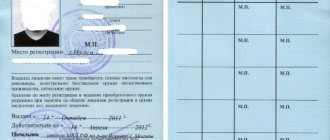Result of consideration of the application
Based on the results of the preliminary consideration of the complaint with the case materials, the higher tax authority has the right to cancel the unlawful decision, as well as make a new decision (order) to hold the offenders accountable in accordance with executive legislation, and to remove them from office.
The law provides a period of one month for its adoption. The period can be extended with the participation and permission (order) of the head of the tax authority, as a rule, for another 30 days in the presence of the following circumstances:
- a citizen (organization) whose rights have been violated has filed new materials on the case, which will require an extension of the deadline;
- During the consideration of a private complaint, a higher authority sent a request (order) to a lower one to provide new documents necessary for a more detailed study of the case.
When is it necessary to appeal a judicial act in part?
The Arbitration Procedural Code provides for the right of a person to prepare a complaint not with the aim of canceling the entire decision, but to cancel only its individual points. For example, when resolving a dispute about children during a divorce (place of residence, alimony, participation in upbringing), the separated parent is not satisfied with the schedule of communication with the child.
The defendant in an appellate dispute may file a motion demanding a review of the verdict in its entirety if he is not satisfied with other points. That is, he objects to checking the judicial act in part. In this case, filing a separate appeal is not required, so all petitions and statements are sent within the framework of one appeal process.
According to Article 268 of the Arbitration Procedural Code, the appellate judge checks compliance with the procedural procedure and legal requirements at all stages of making the initial decision, regardless of the requests of the participants.
How to make new arguments
During the consideration of a dispute in the appellate instance, participants in the procedure are given the right to argue and confirm violations on the part of the first instance judge. Whether the decision will be overturned with the right to re-examine the case largely depends on the stated arguments.
At this stage, the following rules must be observed, which will increase the chance of a satisfactory solution:
- The stated arguments must not contain any mention of a change in the grounds or subject of the statement of claim. But this rule does not apply if the appeal has begun to consider the conflict as the court of first instance. For example, the plaintiff will send an appeal with a request to cancel the signed transaction, since the subject of the contract does not belong to the participant in the transaction, that is, the contract was drawn up without the existence of property rights. In an appeal, it will not be possible to state a demand to cancel the transaction due to the incapacity of the participants, so this changes the basis for the direction of the claim.
- If the plaintiff files a claim in violation of the statute of limitations, the trial court is obliged to consider the case. If during the trial the defendant files a motion to dismiss the case due to missed deadlines, the court will grant the motion. Later in the appeal it will no longer be possible to make such a claim.
- Preliminary notification to the participants of the procedure about your intention to attach additional materials and evidence. This must be done in advance so that the opponent’s side can prepare for the procedure for protecting violated interests.
These rules cease to apply when the dispute is considered by the court of appeal, as the first instance. In this case, the procedure follows the general procedure.
How to write an appeal?
Appeal: sample
Any appeal is written in free form, but the text must contain the following mandatory points:
- The name of the judicial authority to which the complaint will be sent. The full name is indicated, for example, District Court of the Oktyabrsky District, Orsk.
- Full information about the citizen filing an appeal. This is your full name, passport details, and place of residence.
- Decision subject to appeal. It is necessary to describe in detail why you consider the court’s decision to be unfair, indicate all the circumstances that the magistrate or district judge did not take into account, and state your requirements in detail.
- List of documents that are attached to the complaint. These are all documents confirming one or another circumstance of the case. If, for example, a decision on a traffic offense is appealed, then inspection reports, examination results, damage assessment data, etc. must be attached to the complaint.
The complaint must be submitted in the original, but several copies must be prepared according to the number of persons participating in the case. If the complaint does not meet the established requirements, or the state fee has not been paid on time, the judge of a higher instance is obliged to notify the citizen within 5 days that his complaint is being left without progress and provide a certain period for correcting existing shortcomings.
If the deficiencies were corrected on time, then the complaint is sent to the court, and the date of its filing is considered the first day when it was written before it was sent for revision. If the existing shortcomings were not corrected within the allotted time, then the judge returns the appeal, after which the sentence will enter into legal force and be executed within the prescribed period.
Making a decision after considering the complaint, possible outcome
After consideration of the complaint with the case materials by a higher tax authority, one of the following decisions may be made at a meeting:
- completely cancel a decision unlawfully made by a tax authority official in relation to a citizen (organization);
- partially reverse the decision of the tax authority;
- leave the request unfulfilled;
- cancel the tax authority’s resolution and adopt a new one;
- recognize the illegality and illegality of tax transactions performed by tax officials.
Author of the article
Administrative and judicial procedures for considering complaints
Every citizen (organization) whose rights were violated by tax officials has the right to file a private or collective written complaint in order to appeal an unlawful decision after its adoption, as well as restore their rights.
According to the Tax Code of the Russian Federation, restoration of the violated rights of the party affected by the violation is carried out with its participation in three ways:
- by filing a written private complaint or appeal with materials on the case to a higher tax authority;
- judicially. Judicial consideration of a private written complaint, payment of a fee, as well as refusal to consider it is carried out in accordance with the rules established by procedural regulations, as well as in accordance with the Tax Code of the Russian Federation;
- consideration of the complaint by the prosecutor's office.
In case of appealing a tax act by appealing to a higher authority, the applicant has the right to stop the procedure for considering the complaint by sending a new written application to withdraw the application and return it to the appropriate authority.
Rules for withdrawing and returning a private complaint:
- A citizen (organization) has the right to withdraw a petition before the date of the decision. As a result, after a decision has been made, returning a private complaint or postponing the date for its consideration is not allowed;
- The law allows a citizen to withdraw a private complaint either in full or in part (when appealing individual points of a tax act).
Grounds for refusal to consider a complaint (return of a complaint), its postponement
According to the provisions of the Tax Code of the Russian Federation, a petition, the subject of which is an appeal against unlawful decisions of tax officials, may be left without consideration if the following grounds exist:
- leaving without consideration if the document does not meet the requirements established by procedural laws. For example, after the text of a private or collective complaint there is no signature of the applicant/applicants or date of appeal. The absence of required elements is grounds for its return or postponement;
- if a representative acts on behalf of the applicant, whose powers do not have documentary evidence (the absence of a power of attorney is the basis for returning the complaint, refusing to consider it, or leaving the application without consideration);
- the applicant missed the deadline established for filing a petition (if there is no application to restore the deadline, the return of the complaint (appeal), its postponement and, as a result, refusal to consider is not excluded);
- the applicant withdrew the complaint in whole or in part (in case of withdrawal before the date of the decision). If an application for the return of a complaint, including an appeal, is filed after the date of the decision on it, as a result it remains without consideration;
- a complaint filed by a citizen (organization) on similar grounds has already been submitted for consideration by the relevant body earlier, therefore the subsequent one is subject to return (the result is a refusal to consider, its postponement).
Features of the procedure for judicial consideration of a complaint (appeal) in arbitration
Appeals against violations, as well as unlawful decisions of tax authorities, through the Arbitration Court are carried out in accordance with the following rules:
1. The stage of preliminary judicial consideration of the petition is, as a rule, preceded by an administrative appeal of the decision or resolution with the participation of the citizen (the party affected by the violation), by means of his appeal to higher tax authorities with materials on the case.
At the same time, the pre-trial procedure for appealing tax actions is considered to be observed even if the petition submitted to the relevant authorities was not considered in a timely manner or a decision on it was not made at all (refusal to consider the case);
2. Judicial appeal of tax decisions, as well as unlawful actions and inactions of officials of tax authorities is the basis for allowing the suspension or postponement of the execution of the decision made or the implementation of the appealed tax transactions;
3. One of the conditions for the preliminary consideration of the application and holding a meeting is the payment of a fee (the amount of the fee is established by the Tax Code of the Russian Federation).
Regulatory framework
The terms, conditions (state duty), grounds for refusal, the judicial procedure for considering complaints and restoring rights are regulated by the norms of procedural legislative acts, namely the Civil Procedure Code of the Russian Federation, the Code of Criminal Procedure of the Russian Federation, the CAS RF, the Arbitration Procedure Code of the Russian Federation, etc.
As for appealing decisions, as well as illegal actions (violations) or inaction of tax officials, the procedure for considering complaints of this kind with the subsequent restoration of taxpayers’ rights is usually carried out:
- in accordance with Section 7 of the Tax Code of the Russian Federation, in particular with the norms of Chapters 19 and 20 of this legal act;
- in accordance with the norms of other procedural legislative acts, in arbitration procedure.
In addition to the conditions and rules according to which citizens exercise their right to appeal, the above-mentioned chapters of the Tax Code of the Russian Federation contain information about the place of consideration of the complaint, its form and content, the amount of the fee, as well as the grounds for refusing to accept it and subsequent return (leaving the application without consideration , its deposition).
How to present new evidence
It was noted above that it is impossible to add new evidence that has not previously been considered by the first instance. But there are exceptions to every rule. So, on the one hand, the interested person, if he wants to support the evidence, documents that there was no previous opportunity to present valuables/documents. It is extremely rare that you can bring new materials without confirming the impossibility of the previous submission.
New evidence is presented by the person filing the complaint
If you want to add new materials to the dispute, you will need to justify why the applicant was unable to submit them earlier . The judge considers the stated reasons and, if they were indeed justified, may allow new evidence to be added. If the stated obstacles were not significant, then it will not be possible to use the materials as evidence. This rule is contained in Article 268 of the Arbitration Procedural Code of the Russian Federation.
In order to eliminate possible conflicts, the Resolution of the Plenum of the Supreme Arbitration Court limited the list of reasons that are recognized as significant. These include:
- the trial judge, without sufficient grounds, ignored the petition of a participant in the process to order an additional examination or to conduct a procedure for compulsory collection of evidence;
- the court did not accept the evidence because the participant missed the deadline for filing a statement of claim on a specific dispute;
- The complainant had complaints about the protocol of the court session, which does not indicate that the participant had previously filed a motion to add significant evidence.
It will be possible to add evidence in any case if the appellate judge confirms the presence of significant violations of judicial procedure or legal requirements.
New evidence is presented by the person who objects to the complaint
In such a situation, the participant will not need to confirm the lack of opportunity to use the materials earlier in the first instance.






